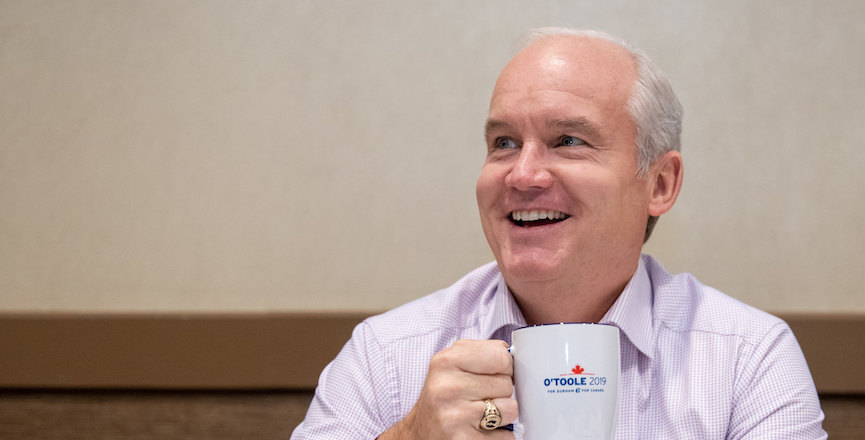Erin O’Toole is trying to put on a kinder, gentler, less-threatening face to his Conservative party as he attempts to appeal to union members, racialized and LGBTQ2+ people. Just beyond the smiles, however, it’s the same old Conservative party: one that would introduce tens of billions in corporate tax cuts and subsidies and cut funding for childcare and other programs to pay for them.
The Conservative platform is chock full of tax cuts and credits, including lots of putzy boutique ones for particular interests and bigger ones for business. These would reduce federal revenues by over $50 billion over the next five years and lead to significant real cuts to federal programs.
Most of the biggest ticket items in the Conservative platform are more tax breaks and subsidies for business and business owners, with more than $26 billion in different direct tax cuts, credits and subsidies over the next few years. These include:
● $13.8 billion in a tax credit for new capital investments over the two years
● $1 billion+ in a tax credit for small business investors over the next 3 years
● $7.6 billion in additional wage subsidies for businesses over the next two years
● Over $1.3 billion to expand the flow-through share tax loophole
● Another $2.2 billion in loan write-offs for businesses
● $500 million+ to eliminate CRTC fees for broadcasters
● $240 million+ to cut the corporate tax rate in half for corporate profits from R&D patents
On top of this, O’Toole is promising workers that they will get a dollar an hour wage increase by doubling the federal Canada Workers Benefit. What he isn’t saying is that only some workers would benefit from this: it phases out at incomes above $13,000. They are only promising this because they’re opposed to increases to the minimum wage, including the wage increase to $15 per hour, which is set to come into effect this December for federally-regulated workers. Instead of having employers pay all their lowest wage employees more by increasing the minimum wage to $15 per hour, the Conservatives would indirectly subsidize employers to the tune of $24 billion over the next five years by providing this tax break.
Including this indirect wage subsidy for low wage employers, the Conservatives platform has over $50 billion in tax breaks for business. Nowhere in their platform is any indication that they would close any tax loopholes or breaks for businesses and the wealthy. What’s even more concerning is that they are also promising to “launch a comprehensive review of Canada’s tax system to improve competitiveness, bring down rates and simplify the rules.” This will only mean even deeper and further tax cuts for corporations.
They are pledging to increase the budget of the Canada Revenue Agency to increase tax compliance, which is one of the very few areas where they show an increase in revenues. This is a good thing, but when their platform creates a whole lot more loopholes for businesses and special interests, and they state strong opposition to forcing large multinationals paying their fair share in taxes, it is hard to believe they would follow through.
Not included in their fiscal plan is the Conservative Party’s stated strong opposition to a global minimum corporate tax on the foreign profits of large multinationals — as was recently agreed upon by over 100 countries at the OECD. If the Conservatives were elected and Canada backed out of this deal, we would be the only major country in the world to oppose a global minimum tax on multinationals.
The U.S. is strongly in support of a higher global minimum corporate tax, as is the Conservative government in the U.K., which is also increasing its domestic corporate tax rate back to 25 per cent. It would be incredibly regressive if Canada backed out of this deal — and reminiscent of when former prime minister Stephen Harper, at the G20 Summit in 2010, scuppered international momentum to have the finance sector pay for part of the costs of the 2009 financial crisis. As a result, the rest of us paid for those costs, and inequality has only gotten worse in the ten years since.
By not forcing large multinationals to pay their fair share, Canada alone would lose out on an estimated over $10 billion in annual revenues — an amount not accounted for in the Conservative platform. The only beneficiaries would be the largest corporations in the world.
Another expensive promise in the Conservative platform is the $9.7 billion that their changes to the provincial fiscal stabilization program would cost. The vast majority of this would go to the Alberta government, and so subsidize Alberta Premier Jason Kenney’s tax cuts for large corporations, which is costing the province billions in revenues.
While the Conservatives are promising many billions in the tax cuts and subsidies for corporations, their tax cuts, credits and programs for individual Canadians are relatively small potatoes, amounting to a few million dollars, rather than the billions they’re promising in corporate tax cuts and subsidies.
And who will pay for these Conservative tax cuts for corporations? By far the largest immediate “savings” in the Conservative plan comes from cutting over $26 billion over the next four years from the ground-breaking affordable childcare plan included in the 2021 federal budget.
This alone shows that despite all O’Toole’s talk, it’s still the same old big-corporation loving Conservative party, using cuts to childcare programs to pay for their tax cuts and subsidies for corporations.
Author’s note: Information on the cost of the Conservative’s plans are available both through the Conservative’s costing document (although it is not clearly presented) and the Election Proposal Costing estimates published by the Parliamentary Budget Officer.
Toby Sanger is director of Canadians for Tax Fairness and former economist for the Canadian Union of Public Employees.
Image: Erin O’Toole/Flickr




